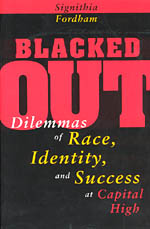"Acting white"

"Go into any inner-city neighborhood, and folks will tell you that government alone can’t teach kids to learn. They know that parents have to parent, that children can’t achieve unless we raise their expectations and turn off the television sets and eradicate the slander that says a black youth with a book is acting white."
—Barack Obama, Keynote Address, Democratic National Convention, 2004
Ron Netsky, a writer for City (Rochester, NY), observed that the term "acting white" has been appearing in the media a lot lately (most recently in The Philadelphia Inquirer and the New York Times) . Signithia Fordham and John Ogbu popularized the term in a study published in Urban Review in 1986. Fordham is also the author of Blacked Out: Dilemmas of Race, Identity, and Success at Capital High, a book which explores academic achievement within the Black community and the price students pay for attaining it.
Earlier this month, Netsky interviewed Fordham about Black education issues and what it means to "act white."
City: In Blacked Out, you write that one of the things that seems to make the education process difficult is generational.
Fordham: After the Brown decision and the Civil Rights act—in the 1960s generally—black people were engrossed in acknowledging what they had achieved. Their children were the kids that I studied, and their parents were always baffled by why their kids wouldn’t take advantage of what they saw as the wider opportunities available to them. And rightfully so. You fight for something so hard, why don’t the kids do so much better? Because if we had those opportunities, we would have gone much further in life than we’ve actually gone.
But they don’t get what is happening in culture systems, how they operate. These kids are fearful of the loss of identity. This is not something they would verbalize or even have the understanding to talk about if you asked them.
The rest of the interview and an essay by Signithia Fordham titled "Was Rosa Parks ‘acting white’?" can be read here.
Visit our black studies catalog.